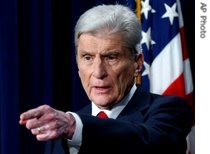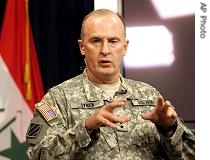2007年VOA标准英语-US General: Early US Iraq Pullout Would be 'Gia(在线收听)
Washington
24 August 2007
The U.S. military commander in one of Iraq's troubled areas has rejected a call by influential Republican Senator John Warner to begin withdrawing U.S. troops by the end of this year. Army Major General Rick Lynch spoke to U.S. reporters in a video conference from Iraq Friday. VOA's Cindy Saine reports from Washington.

Senator John Warner
Major General Lynch, commander of coalition forces south of Baghdad, rejected Warner's troop pull-out suggestion, which came as a shock to many politicians in Washington.
"In my battlespace right now, if coalition soldiers were to leave, having fought hard for that terrain, having denied the enemy their sanctuaries, what would happen is the enemy would come back. He'd start building the bombs again, he'd start attacking the locals again, and he'd start exporting that violence into Baghdad and we would take a giant step backwards,'' he said.
Lynch said his forces are battling both Shi'ite and Sunni militants, and are confronting Iranian infiltrators in the region. He said withdrawing some troops from Iraq might be possible by next spring or summer, if significant progress is made.
 |
| Major General Rick Lynch (June 2007 photo) |
Warner, of the Senate Armed Services committee, called on President Bush Thursday to announce the beginning of a troop withdrawal from Iraq on September 15.
"Take into consideration the need to send a sharp and clear message throughout the region, to the United States, and one that people can understand; I think [there is] no clearer form of that than for the president to announce on the 15th, that in consultation with senior military commanders, he has decided to initiate the first step in a withdrawal of our forces," he said.
Warner, who has strongly supported the war effort, said it would be up to the president to decide how many of the more than 160,000 U.S. troops in Iraq to withdraw. He said the withdrawal would be a way to press Iraq's government into taking steps toward political reconciliation.
A White House spokesman says the president is waiting for recommendations from General David Petraeus, the U.S. Commander in Iraq, and the U.S. Ambassador in Iraq, Ryan Crocker. Their report is due by September 15. Congress will be briefed on its contents.
Major General Lynch made his comments one day after a new report by U.S. intelligence agencies said Iraqi forces cannot cope with the current violence without continuing assistance from U.S. troops.
The summary of the National Intelligence Estimate also says any drawdown of U.S. forces from a counterinsurgency role to one of support for Iraqi forces would erode security gains achieved during the current "surge" of U.S. forces in Iraq.